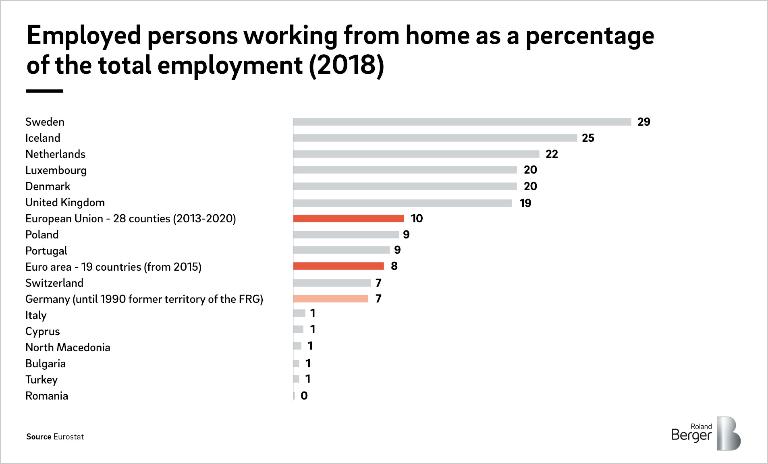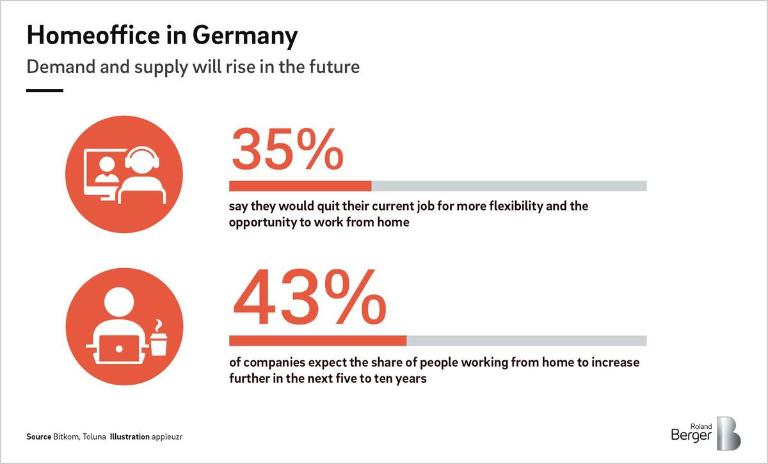

Digital workplace in the era of Covid-19
How the current crisis will change the culture of our work
What does the future of work look like? The coronavirus crisis will have an enormous impact on the world of work and, indeed, on the culture of work. On the one hand, the mass introduction of digital workplaces can bring productivity gains for companies. On the other hand, the enforced tendency toward teleworking on a massive scale will demonstrate how important social interaction and maintaining the company culture are for an innovative and creative workplace culture.

Covid-19 and the reorganization of work: What will the "new normal" look like?
In the future, the novel coronavirus outbreak might be viewed as the moment when the way we used to work fundamentally changed.
Will the current situation be seen as the dawn of a new era of digital workplaces? As the beginning of the end of the traditional working world and office structures that were associated with a clear separation of the workplace and private life? Or, conversely, will the economic and social disruption caused by the disease rejuvenate the importance of personal contact and a social working environment?
One thing is certain: company culture, leadership, employee experience, and the whole digital workplace experience are now being put to the test. The way many companies work will change overnight and there will be no return to normal. The cultural and economic organization of work will feel different. The problem is that we don't yet know what that difference will be.
The potential of digital workplaces: An increase in productivity!
Teleworking is currently the work mode of choice for many companies wanting to maintain operations in the face of the new coronavirus.
The key question from an organizational perspective is whether this enforced period of working from home will lead to a greater rollout of this mode of working in the future, or whether it will remain an emergency measure.
If we look just at Europe, Germany -- Europe's biggest economy -- ranks close to the European average and can thus be taken as a typical European example, whereas the Nordic countries are more advanced in enabling employees to work from home.
Let us now take a closer look at Germany. Irrespective of what impact the coronavirus crisis has on the mass expansion of teleworking, working from home is becoming increasingly popular in Germany, as data from Statista shows. 43 percent of companies surveyed for a Bitkom study expect the proportion of employees working from home to increase in the next five to ten years. The same study shows that 30 percent of firms already rely on teleworking.
The concept is also popular among employees. 35 percent say they would leave their current job to gain more flexibility and the possibility to work from home.
Whatever the future of digital workplaces may one day look like, it is already true to say that people working from home face some specific challenges.
Those who work from home or remotely from elsewhere inevitably accept that the clear boundaries between their professional and private lives will blur. And while teleworking can provide more freedom and flexibility, it is also associated with the need for greater personal responsibility. Managers and affected employees must, therefore, jointly examine how the balance between private and professional needs can be maintained – not least from the point of view of protecting health.
Thus, while working from home comes with strings attached – both for the company and for its employees – it has concrete benefits. New research suggests that companies that let their workers decide where and when to do their jobs – whether in another city or in the middle of the night – see increased employee productivity, reduced turnover, and lower organizational costs.
Prithwiraj Choudhury, an associate professor at Harvard Business School, and his fellow researchers compared the outcomes of flexible work arrangements. The team found that employees with liberal work-from-anywhere arrangements were 4.4 percent more productive than those following a more traditional work-from-home policy that gives schedule flexibility but requires workers to live near the office. Choudhury's findings can help firms understand the effects of various flex-work options and support certain types of employees as they negotiate with employers.
Successful remote companies have well-established processes to continually ensure that people are socializing and no one is feeling isolated and falling through the cracks.
It's the culture, stupid: Why emotions and social interaction play a decisive part in the future of our work
These potential productivity gains are offset by cultural and social challenges linked to the current tendency toward enforced teleworking on a massive scale. Technology will play a huge part in determining the success of the new ways of working. But that is only one part of it. How successfully and how efficiently digital workplaces will integrate into the culture of any company is not primarily a matter of IT. Rather, it depends on how well the company culture is maintained and what possibilities are offered for social interaction between employees.
Humans are social animals not accustomed to being "socially distanced", even if we choose to work remotely. How long people can stay socially disconnected will be tested by the Covid-19 outbreak and its implications for the social organization of work. Empirical research shows that what remote workers gain in productivity, they often lose in harder-to-measure benefits like creativity and innovative thinking. Studies have found that people working together in the same room tend to solve problems more quickly than remote collaborators, and that team cohesion suffers in remote work arrangements.
But being near other people also allows us to express our most human qualities, like empathy and collaboration. Those are skills that can't be automated. And they're what produce the kind of meaningful interpersonal contact we miss out on when we're stuck at home. How leaders, managers, and organizations as a whole support employees on many different levels will be the ultimate barometer of company culture and employee experience. And it's this company culture that will determine whether the possibilities for higher productivity are actually realized.
Conclusion: Not all remote companies are successful
Successful remote companies have well-established processes that continually ensure that people are socializing and no one is feeling isolated and falling through the cracks. That's very important right now, especially with all the fear and insecurity we're feeling at the moment. To unleash the opportunities of digital workplaces, we now need to usher in a new era of the organization of work. A new era of digital workplaces offers much promising potential. But to transform this utopia into reality, digital workplaces must be embedded in a culture of close interaction and cooperation. This will allow us to combine gains in productivity with creativity and innovation.
Albert Einstein once observed that our most significant problems cannot be solved at the same level of thinking at which they were created. The global outbreak of COVID-19 presents a significant problem. However, amid its volatility, uncertainty, complexity, and ambiguity lie hidden opportunities for learning, reinvention, and evolution – at the individual, organizational, and societal levels.
Roland Berger is exploring the broader social implications and macroeconomic consequences of COVID-19. For our latest research on this topic and related articles, please contact [email protected] .





